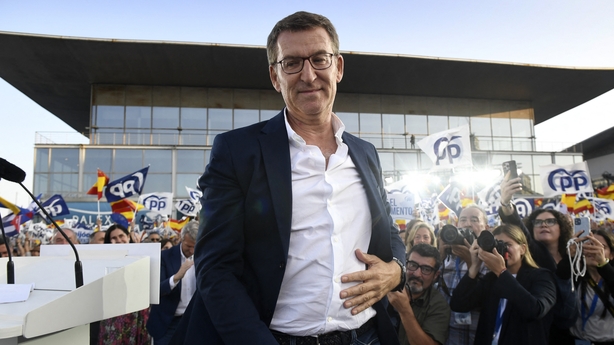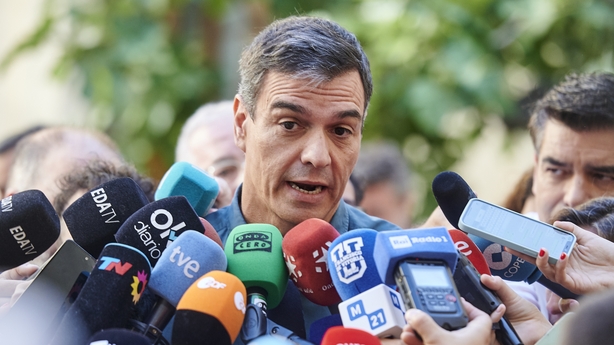Widely expected to win Sunday's snap election, the right-wing Popular Party was only a handful of votes ahead of the Socialists with two-thirds of the votes counted, leaving Prime Minister Pedro Sanchez a chance to cling onto power.
With more than 67% of the ballots counted, the PP had 131 seats while the Socialists had 128 in the 350-seat parliament, official figures showed.
The far-right Vox had 33 seats while the radical left-wing Sumar had 30, with both sides racing to reach 176, the figure needed to form a governing majority.
Polls had predicted a decisive victory by Alberto Nunez Feijoo's PP but without a working majority, which would force it to turn to Vox for support to govern.
The vote took place just three weeks after Spain took over the rotating presidency of the European Union, and the expected shift to the right would have dealt a fresh blow to the European left.
Spain has never previously held an election at the height of summer and in parts of the south, temperatures were touching 40 degrees Celsius.

Read more: Who are the candidates in Spain's general election?

'New era'
"Spain can begin a new era," said Feijoo as he cast his ballot, while Socialist Prime Minister Pedro Sanchez said it was a "very important" moment, "not only for us but for Europe and the world".
Were Vox to enter government, it would be the first time the far-right had hold a share of power in Spain since the Franco dictatorship ended in 1975.
Vox is part of a Europe-wide trend that has seen far-right parties taking power, either alone or in coalition, in places like Hungary, Italy and Finland.
Sanchez warned that a PP-Vox government would take Spain into "a dark time warp that will leave us who knows where".
Among its election pledges, Vox wants to overturn laws on gender violence, LGBTQ rights, abortion and euthanasia as well as outlawing separatist parties and defending traditions such as bullfighting.
In an op-ed in France's Le Monde, former British premier Gordon Brown called Vox's agenda "chilling", warning its entry into government "would push Europe one step further into a right-wing abyss".
'Should be forbidden'
Since the vote took place at the height of summer, many people were on holiday and so a record 2.47 million people casting their vote by post.
Many voters also said they had cast their ballots earlier to avoid the scorching heat. At the polling stations, electric fans were working overtime to keep people cool.
"Holding the vote at this time of year is ghastly... it should be forbidden," 80-year-old Maria Suner told AFP at a polling station in central Madrid.
Sanchez, 51, called the snap poll after his Socialist party and its far-left allies were heavily defeated in local and regional elections at the end of May.
Despite a strong economic performance on his watch, Sanchez's standing has suffered due to the political deals his minority coalition has had to make to push through legislation.
Since Sanchez became premier in 2018, Spain's economy has outperformed most of its EU peers, growing by 5.5% last year, with inflation dropping below 2.0%, a rarity in Europe.
He has also introduced a sharp rise in the minimum wage, higher pensions and free commuter rail travel.
But his government's reliance on Catalan and Basque separatist parties to pass legislation has hurt his standing, as has his occasional deals with Bildu, the heir of the political arm of the disbanded Basque separatist group ETA.
Another major blow was a botched rape law that let more than 1,000 convicted sex offenders secure a reduction in their sentences.
Feijoo, 61, has vowed to overturn many of Sanchez's laws, including one allowing anyone 16 and over to change their ID card gender on the basis of a simple statement.
If the PP and Vox fall short of a working majority, that would give the Socialists a chance to form another government because they have more options to create alliances.
Analysts could not rule out the possibility that neither side could secure a working majority, which would force a repeat election, as happened in 2019.
